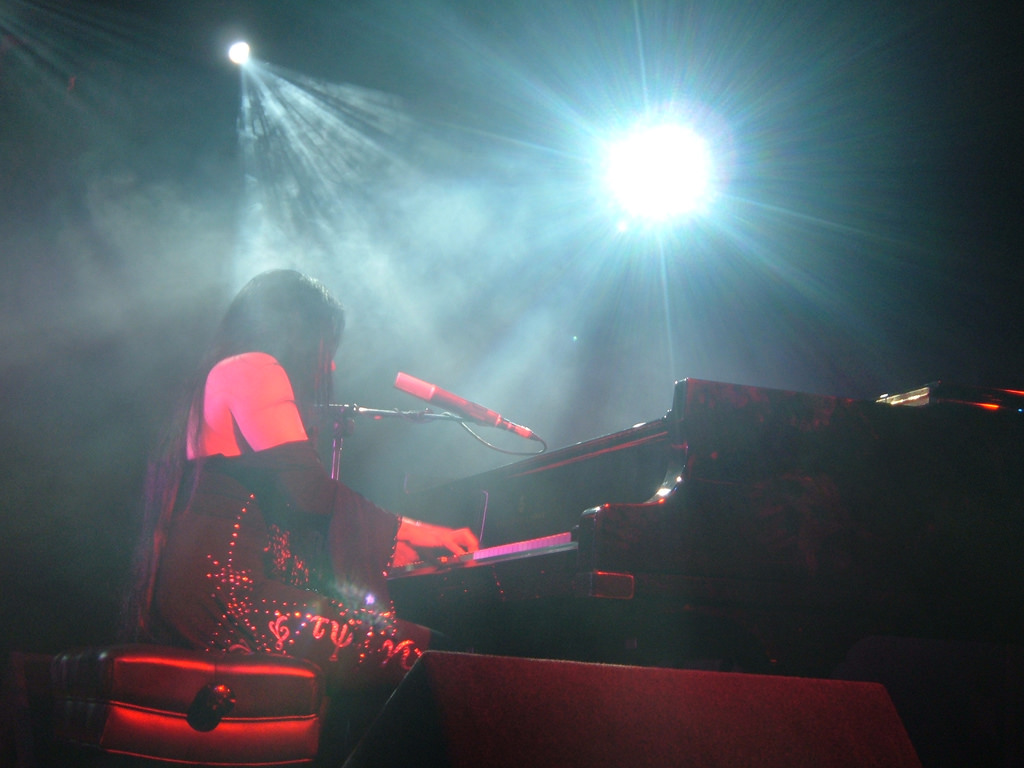If the “Great American songbook” is by now a cliché, and musicians making standards albums is even more so, then Diamanda Galas’s two new albums are a metaphorical tearing up—and assembling back together with blood, sweat, and her signature beautifully jagged piano skills—of several of those classic songs. Long categorized under the vague descriptor of “experimental” music over the last three decades, Galas has made a fine career out of being musically confrontational and truly avant-garde; her music has tackled everything from the HIV/AIDS crisis (1990’s Plague Mass) to the denial of the Armenian, Anatolian, and Assyrian Genocides (Defixiones: Will and Testament, from 2003). Fittingly, her two new albums, All the Way and At Saint Thomas the Apostle Harlem continue her intense career trajectory—and cement her status as one of the greatest singer/composers of all time.
Galas has put her (in)famous four-octave vocal range and classical piano training to meticulous use in her back catalog, and the songs on these two albums receive similar treatment. At Saint Thomas is not her most accessible live recording—that dubious honor goes to Malediction and Prayer, from 1998—but it does add much to her already intense recording career. The opening track, “Verra la morte e avra i tuoi occhi,” literally translated as “Death Will Come and Have Your Eyes,” takes as its starting point the poem of that name by Italian writer Cesare Pavese, turning the poem into an almost tender, aria-style song that is as beautiful as it is unsettling.
Most of At Saint Thomas has Galas adapting some of the poetry of both Pavese and German writer Ferdinand Freiligrath, with a couple of her concert standards thrown in—her creepy, flighty version of folk classic “O Death” calls to mind an animal caught in a trap and unable to escape. As with the majority of the material contained in At Saint Thomas, the song is both gorgeous and deeply disturbing.
All the Way continues Galas’s clever appropriation of the great American songbook; the title track, made famous by Frank Sinatra, sounds nothing like Old Blue Eyes’ version of the song. Galas begins the song with a tinkly piano line that wouldn’t sound out-of-place in a swanky jazz club—until her hands come crashing down on the keys a few seconds after the vocal melody begins, starting a trail of discordant notes that lead listeners down a veritable rabbit hole of unnerving vocal wails. By its end, “All the Way” starts to sound like it could be the soundtrack to the bloody, visceral climax of a slasher film.
https://www.youtube.com/watch?v=6MEYpa2kwGs
Later on the album, “The Thrill is Gone”—first made famous by B.B. King—gets a slow-burning sonic makeover, during which Galas spends the first three minutes of the song making the listener awash in deep vocal melody, then burying the lyrics in a vulture’s screech, naturally accompanied by discordant piano chords. Things get even weirder on “Round Midnight,” during which Galas slams, bangs, and aggressively whips her piano into a frenzied state; if you thought you’d heard the last of her extreme piano skills, you’ve thought wrong.
Both All the Way and At Saint Thomas are strong entries into Galas’s already excellent catalog; however, seasoned fans will know what to expect, and this can be a good or bad thing depending upon your perspective. Since she has come to rely on the piano/voice combo in recent years, it might be advantageous for Galas to further experiment with a full band for her further deconstructions of the Great American Songbook—or even a jazz combo. No matter what her next musical steps are, however, Galas has built a reputation as a skilled political boundary-pusher in addition to being a great vocalist and composer. In the worrying age of Trump and his cronies, it’s great to have her back in any form.
Photo: Rich Jones/Creative Commons

